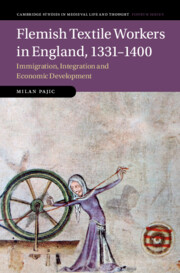Book contents
- Flemish Textile Workers in England, 1331–1400
- Cambridge Studies in Medieval Life and Thought Fourth Series
- Flemish Textile Workers in England, 1331–1400
- Copyright page
- Contents
- Figures
- Maps
- Tables
- Acknowledgements
- Note on Currency, Weights and Measures
- Abbreviations
- Introduction
- Chapter 1 Anglo-Flemish Economic Relations, Complex Urban Revolts and the Politics of Collective Exile in Flanders
- Chapter 2 Flemish and Brabantine Immigrants as Permanent Residents in England 1351–1400
- Chapter 3 Social Relationships and Business Networks of the Flemish Community in England
- Chapter 4 Economic Activities of the Immigrants from the Low Countries: Wool and Woollen Cloth Production and Trade
- Chapter 5 Women from the Low Countries in England and Their Economic Activities
- Chapter 6 Anti-Fleming Sentiment and the Peasants’ Revolt of 1381
- Conclusion
- Book part
- Select Bibliography
- Index
Chapter 3 - Social Relationships and Business Networks of the Flemish Community in England
Published online by Cambridge University Press: 16 November 2023
- Flemish Textile Workers in England, 1331–1400
- Cambridge Studies in Medieval Life and Thought Fourth Series
- Flemish Textile Workers in England, 1331–1400
- Copyright page
- Contents
- Figures
- Maps
- Tables
- Acknowledgements
- Note on Currency, Weights and Measures
- Abbreviations
- Introduction
- Chapter 1 Anglo-Flemish Economic Relations, Complex Urban Revolts and the Politics of Collective Exile in Flanders
- Chapter 2 Flemish and Brabantine Immigrants as Permanent Residents in England 1351–1400
- Chapter 3 Social Relationships and Business Networks of the Flemish Community in England
- Chapter 4 Economic Activities of the Immigrants from the Low Countries: Wool and Woollen Cloth Production and Trade
- Chapter 5 Women from the Low Countries in England and Their Economic Activities
- Chapter 6 Anti-Fleming Sentiment and the Peasants’ Revolt of 1381
- Conclusion
- Book part
- Select Bibliography
- Index
Summary
One of the ways for immigrants to speed up the process of integration was by expanding their social and business networks. The fact that they arrived as a large group with similar backgrounds (e.g. textile workers, exiles with families) provided them with the basis to form a network of family and friends that would reduce the economic and psychological risk of migration. The evidence confirms this pattern, as the immigrants from the Low Countries maintained closer relationships with their compatriots. They inevitably mixed with the native population; however, as we will see later, their relationships with the English were largely based on business . But what were the strategies the new arrivals used to strengthen their position in the new environment? How did the Flemings create and expand their social and business networks? The present chapter is concerned with exploring the integration process of the immigrant community, and how it reflected on both their daily life and the organization of their trade. It will examine the social and business networks of the Flemish immigrants as evidenced in the surviving testamentary records and through the judicial documents.
- Type
- Chapter
- Information
- Flemish Textile Workers in England, 1331–1400Immigration, Integration and Economic Development, pp. 131 - 167Publisher: Cambridge University PressPrint publication year: 2023

